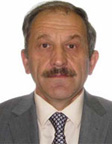Formation of the Modern Paradigm of Interdisciplinary Research of Improvement Problems of Effectiveness of Institutional Relations in Transformational Processes of Global Economy in Social and Economic Systems Development
Basic Division: Department of Economics and Industrial Markets
Brief Description of Research Activities
The development of social and economic systems is largely determined by the institutional environment and institutional frames of its functioning. The environment is, to a great extent, a result of the established national institutional model, as well as a result of factors reflecting its spatial characteristics. The factors comprise the following: regional culture specificity, people’s psychology, established relationships between major influence centers of the region, etc. Under the effect of formal and informal institutional frames of the institutional environment the relations are forming between economic agents in the region and out of it – there are the institutional relations. The character of the relations (harmonious and conflict-oriented) determines the effectiveness of the social and economic system functioning on the whole and its place in national economy.
The present paradigm, based on structural modifications, does not correspond to the changes in the external environment; the government’s control sphere is constantly reducing: market borders no longer match administrative borders, economic activity of the top business units in the present-day conditions cannot be effectively ruled by regional authorities due to globalisation.
At the present time neoclassical economics, based on assumption that all markets should function in accordance with one model, does not meet the modern requirements and is unable to propose other market models, which can be sensitive to the specificity of the developing countries; the effectiveness of the institutional relations influences the level of social and economic development of the territory, which requires the incorporation of institutional economics into economics; to solve the problem of the development of the territory it is suggested to carry out interdisciplinary research, i.e. in the aspect of sociology, philosophy, politics, ethnology and other sciences.
Determination of the order parameters for a complex nonlinear system is a key to understanding its complex behavior. The order parameters allow us drastically reducing the complexity of the system involved and relatively simply describe the functioning and developing of the complex and multidimensional system, whose behavior at the level of elements is highly complicated and chaotic.
The new trend of the thermodynamic analysis of social processes and social self-organisation reveals that all systems include subsystems, which always fluctuate. Fluctuation or a number of fluctuations can so destabilize the system that the present organisation will not stand it and will collapse. In this point – the bifurcation point— it is absolutely impossible to predict, in which direction the system will further develop. Either the system status is chaotic or it would reach a new, higher level of organisation — the dissipative structure level. In the course of self-organisation there is spontaneous order and organisation out of chaos.
Thus, formation of effective regional institutes, which coordinate social and economic interaction between economic agents, based on the modern paradigm, will largely allow eliminating present contradictions, lowering the level of transactional costs in the real sector of economy and providing sustained development of the region as a social and economic system.
Selected Publications Characterising Field of Research
1. Malyshev Yu.А. Economic growth and effectiveness of institutional relations in the real sector of economy. Monograph. 2008. (in Russian)
2. Malyshev Yu.А. «Theoretical and methodological grounds of research of institutional relations in the region, economic-social approach». Monograph. 2009. (in Russian)
3. Malyshev Yu.А. «Institutional relations and coherence of self-organisation processes in the innovation sector of the region». Monograph. 2010. (in Russian)
4. Malyshev Yu.А. «Development and perspectives of the region’s industrial policy in globalisation (theoretical and methodological justification, practice perspectives). (in Russian)
5. Malyshev Yu.А. Elokhov А.М. «Economic sovereignty and installation of global economy in polychromatic city space». Monograph. 2011. (in Russian)
Most Significant Fundamental Research Projects
1. Research Scientific Work - Generalization of theories and approaches to harmonisation of Federal subject’s interests and regional economic complex: report RSW/Perm Branch of Institute of Economy of UB of Russian Academy of Sciences. Perm-Yekaterinburg. 2004.
2. Research Scientific Work - Harmonisation of Federation subject’s interests and regional economic complex: institutional aspects of social and economy systems development: report RSW/Perm Branch of Institute of Economics of UB of Russian Academy of Sciences. Perm-Yekaterinburg. 2005.
3. Grant RHSF № 07-02-00195а «Theoretical grounds of study of institutional relations in territorial community». 2007-2008.
4. Grant RHSF № 08-02-82202а/U «Theory and methodology of study of institutional relations in the innovative sphere of the region». 2008-2010.
Most Significant Applied Research Projects, Including Enterprise Orders
1. Development problem analysis of thermal power system in Kungur. 2003.
2. Formation of stable development institutions in thermal power complex of Perm region. 2005.
3. Development of the conception of thermal power complex in Dobryanka. 2007.
Training of Researchers
Specialty 08.00.05 – Economics and Management of National Economy 2007-2011. Supervision and defense of 3 Candidate theses.




